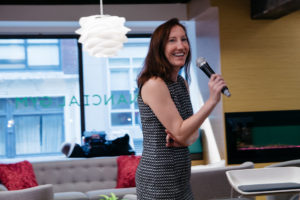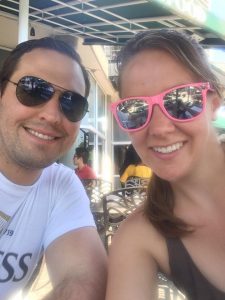Matt Lane is a the author of the blog, Optimize Your Life. As a part time blogger, and full time attorney, husband and new father, Matt’s goal is to help people learn that the purpose of money is to allow us to live a happier life, so we need to focus on the big picture of how to build that happy life rather than just focusing on the money and fun fact- we randomly found out we’re neighbors!
Welcome!
[3:17] Hi. Hi how are you. Good.
[3:21] So you’re also a neighbor and local to D.C.. What do you like to do when people come to visit you from out of town.
[3:31] Yeah. Well I think it depends on whether they’re new to D.C. whether they’ve been here a bunch of times. The first Go2 is always the monuments and museums which seems to be pretty obvious for D.C. locals. Free and amazing for people that haven’t been there before. It’s really like the essence of D.C. For folks that have been there before and have done all the museums. There’s really a great restaurant scene here now which is pretty interesting and there’s a lot of good breweries and wineries in the area. So depending on what people’s interests are like to hit those up.
[4:16] So let’s chat about your blog a little bit, so your blog optimize your life. You had a popular post that was titled Hard work doesn’t pay. Can you tell us a little bit about it.
[4:26] Sure. So the idea behind it is that there are there’s a large change going on in the economy and we are not really adjusting to meet that change.
[4:42] So as basic as background it’s dealing with the value of capital versus the value of labor.
[4:51] Any money changes hands is either going to capital or to labor. So if I make money you make money by working which is Labor or by making money off of my investments which is capital in the same way if I buy something from Wal-Mart. Part of that money goes to the shareholders which is the capital and then part of that money is paid to the workers whether they’re the folks working the floor are the cashier the manufacturer and the truck driver that delivers it. That’s all labor so what we’ve seen from the data is that from at least the 1400’s through around 1970 the share of money going to capital and the share of money going to Labor has been relatively consistent. There’s been some ups and downs there’s been some times when capital makes a bit more sometimes when labor makes a bit more but it’s relatively consistent since 1970 that has been off the charts. The value of labor has been going down down down the value of capital has been going up up up. And this is a huge change that we’re not really addressing at all. And it’s one of the drivers of inequality that we see right now in that the people with the most stock are generally the people with the most money and the people that rely the most on work are the people that are the poorest. So as it gets easier to make money off of stock the rich are getting richer and as it’s harder to make money off of your labor the poor are struggling more and more.
[6:43] Yeah and I think artificial intelligence is definitely one of the. One of the drivers behind this globalism as well in the U.S. it’s going faster than in the rest of the world. So we’re seeing it’s also the decline of unions and deregulate it de regularisation deregulation deregulation early don’t. Yes. So deregulation and the decline of unions are sort of speeding right along. But I don’t see any real way to change this trend. I’m sure there must be one but with a eye in globalization kind of just pushing relentlessly. You know it seems like we may need to go to something like a universal basic income or you know some other method of redistribution to address the trend. So where did the idea for your blog come from so I get sort of obsessive about learning different things. And I’ve gone through a lot of different phases of that happiness in psychology economics and economic policy personal finance financial independence and I hit a point where enough people were asking me for advice on all of those different topics that I thought it might make sense to to write about it publicly that there may be some value there for people that I know that were not in my friend circle. So I decided to start working on that.
[8:18] And I felt like they could all be sort of drawn together by the idea that they all contribute towards living a better life fantastics.
[8:27] What would you say some of your goals are for Optimized Your Life?
[8:31] I think for the most part I want to help people look at the bigger picture. I consider myself in the personal finance space even though I spend maybe a third of my time talking about personal finance. But I think one of the issues with a lot of personal finance writing is that you get bogged down in the details. You know how can I save more money. How can I invest more. How can I make more. And that’s all good. That all helps.
[9:33] But if you get too lost in the numbers then you forget why you need more money why you want more money.
[9:11] And it’s important to remember that it’s all for a greater purpose that you need to be able to step back be able to work towards that happier life and not just more money.
[9:22] So talking about money you have had quite a few side hustles in your day. Have you had a favorite or least favorite?
[9:33] Sure. And I think I don’t know most of these I don’t know that I’ve considered them really side hustles. I just kind of take on work that I find interesting. So my you know my version of the side hustle is not really you know driving for Uber or Airbnb and that sort of thing. Although I had a few conversations with Kevin from Financial Panther and he is the master of all of that. So to that end I think the most fun that I’ve ever had on a sort of side job was I played trumpet for the U.S. national tennis teams. So I would fly around to different stadiums in the country and play in basically a pep band for you know sold out stadiums and it was super fun.
[10:32] A lot of really cool and met a lot of you know great people and had a lot of fun.
[10:38] Oh that’s really cool yeah. Have you had one of those. Not so great?
[11:15] Between law school and my current job I had about six months where I was studying for the bar and then applying for government jobs and government hires much later than private sector jobs. So I was trying to make enough money to pay rent. And at that time I was doing three separate part time jobs 30 hours a week sort of a legal temp job.[11:15] But one of the other jobs was I counting passengers on the metro. So I was trained to look at the number on each metro car on each subway car. And from that know how many seats were in it. And then as it rolled into the station and out of the station I was supposed to count the number of passengers in my assigned car write it down and then wait for the next train.[11:43] That’s not a very long time to count all those people that have been kind of hard.[11:49] It’s surprisingly hard but you kind of pick up the tricks and get good at sort of quickly eyeballing how many empty seats there are versus how many people are standing. And it’s hard to estimate based on that. I didn’t even know those a thing.[12:9] Yeah I actually had a random train job as well, where I had to count the coaches because the company that I was well the company also contracted to. They don’t know how many trains they had so we were counting out the units of each coach and each locomotive and each actual train. It was quite an education I must say.
[12:33] It’s interesting it’s always bizarre seeing sort of what jobs exist that you would never have thought could exist.
[12:40] Yeah I don’t mean like it doesn’t sound like a glorious job but at the end of the day each one of these trains a scrap value of about $5000. So even if you find one, then it’s worthwhile.
[12:53] Yeah yeah sure. Wow.
[13:0] Ok. Well you’re also a new dad? Congratulations.
[13:6] Thank you very much.
[13:7] So what is the biggest shock when it comes to the parenting I know you can’t like really be prepared and you probably didn’t actually know what you were doing.
[13:21] So I will start this by saying I’m seven weeks in and things can change a lot. But at this point I think I’ve been surprised that the actual caring for a tiny human. Not part of the job has been easier than I expected. But the lack of sleep has been so much harder to deal with. You know everyone tells you you’re not going to get sleep and you know you’re prepared not to sleep as much.
[14:25] I was not fully prepared for that. I can certainly imagine I’ll become a different person when I’m tired.
[14:6] Yeah yeah.
[14:7] And I actually I recently published an article on how important sleep is to productivity. And I had planned the article before the baby was born.
[14:18] And I had done and I had done all the research and then I went I actually wrote it a couple of weeks ago.
[14:25] I wrote it with the research and then saying OK yeah this is true. Here’s how this has affected my mood. Here’s how this has affected my health. Here’s one this has affected my productivity and it’s it’s pretty intense.
[14:39] Awesome! Do you have any subsequent tips when it comes to paying for day care since it’s such a big expense.
[14:46] Yeah. Daycare is insane especially especially in this area where we live so we my wife and I looked at a lot of different daycares in the area and for sort of the certified safety certified daycares you’re looking at between 20 and 30 thousand a year.
[15:13] Wow.
[15:16] Yeah. The median individual income in the United States is thirty thousand dollars. So I it’s just bonkers and I don’t understand how people without sort of being lucky enough to have our paychecks manage it. That’s insane. Well yeah but it’s I think really the best advice is just sort of plan for it as best you can. You know we we picked our favorites and we looked towards the lower end of that spectrum and we got on wait lists and it turns out we’re almost to the point where we need to put them into daycare where my wife and I are both going to be working.
[15:58] And the only daycare and it looks like we’re going to get off the waitlist is the most expensive of course because people who are taking their kid out can’t afford it right.
[16:13] So where you know as much as I would love to be able to say you know here’s a hack to getting cheaper daycare I think the best approach is just plan ahead of time try to get your expenses down so that you can handle it and you know figure out what works best for you and your family.
Sponsor
[16:32] Chain of Wealth – If you need some freelance reader work Katie is available for hire! Check out our contact page to get in touch.
Value Link Round
[16:59] All right. So why do you think people struggle to achieve their dreams?
[17:3] Well that’s a very tough question.
[17:6] I think there are two types of parallel answers here. I think the first is that some people just don’t have the opportunity and that’s tough to hear.
[17:22] But you know if you’re working three minimum wage jobs to be able to feed your family you don’t really have the time to go after your goals. It’s you know there’s we live in a pretty unequal society and you know there’s two that’s just sort of a tough reality that we that we face.
[17:47] And that’s not actionable either. But it’s important to remember that that you know if you have the opportunity to pursue goals then you are already sort of in the privileged few. And that’s something that you know we should all be grateful for and something that we should remember. But for more actionable information that’s actually useful for your listeners. I think that we tend to approach big goals as you know dreams that we hope come to us rather than problems that we need to solve. For 2018 on my blog I’m doing each month I’m focusing on a different area of life and sort of working on how to improve that. And I started in January with wife planning which was not something I ever really spent any time on or done any research on. So I read a ton of books took you know some of the online courses read as much as I could and everyone has their own spin but it really breaks down to three steps. You pick an area of your life and then you figure out where you are where you want to go and then a plan to get from A to B. Right. And I think that’s what we need to be doing with our goals. We need to figure out what we really want we need to figure out where we are relative to that and we need to make a plan a solid plan to get from where we are to where we want to be. And I think most people just don’t actually break it down like that.
[19:19] That is definitely actionable. So could you recommend any other books will put cost formlessness.
[19:27] Sure. I’m sure that others because you have a lot of personal finance so I’m sure that others have recommended Your Money or Your Life. I think that’s sort of the most game changing book in the finance. But as to sort of success generally I’d say Cal Newport has a couple of really good books deep work and so good they can’t ignore you. And then on happiness I think the how of happiness by Sonia Eliava Moreschi. It’s just google happiness. That’s I think the best book in the space. It’s very much research based. So it’s a bit drier but it really is sort of most books and unhappiness are sort of here’s what makes me happy.
[20:17] This book is Here’s what I study after study after study has shown works on the majority of people and gives you really actionable ways to make your life happier right now which I think is is great and really useful and so many people need that kind of like jumpstart.
[20:37] Yeah. Yeah for sure. Yes. Do you have a favorite quote.
[20:41] I kind of go through quotes depending on where I am in life. I think last year my my quote was the way you do anything is the way you do everything. Which the sort of ideas. There’s no there’s no small. There are no small things right. You’re constantly creating who you are and you can’t take shortcuts to that you know. Are you someone that has says things. Are you someone that takes take shortcuts. Because if you do that on things that you feel like don’t matter. It becomes easier to fall into the habit of doing them on things that do matter and it’s not always easy to delineate and to avoid that slippery slope. As of right now I don’t know that there are necessarily quotes but I have to post it notes on my desk. One is one says Where is the resistance on which is this idea that there’s always something that you’re instinctively avoiding. And I’ve found that if you figure out what that is and go that first thing in the day the rest of the day will go so much smoother. And it’s it’s tough to do.
[21:59] You know it’s it’s hard to sort of feel like okay whereas a big hurdle let me jump that. But if you do that early in the day everything else becomes easier. And so I’ve found that having that quote by my computer is really useful. The other one is I it just says progress. Which is a reminder that even when something feels overwhelming I need to just keep moving forward a little bit of progress every day will eventually add up to something big. I don’t need to knock it out of the park every day. I just need to move forward.
[22:29] That’s definitely true. It’s easy to lose track of where you’re going to if you get stuck in the rat race for sure.
[22:38] Awesome. Matt we loved hanging out today. What is the best advice someone has ever given you. And then we’ll say goodbye.
[22:46] Sure. So I think I don’t know that I would call it necessarily advice given to me but I think that the the most impactful advice that I’ve read was from Gail Collins who is sort of one of the fathers of the financial independence movement.
[23:5] He was one of the early bloggers there and his he really sold the idea of what he calls a few money which is basically saving up enough money that it doesn’t matter what people think of you. So that if someone tells you to do something you can say F you I’m not do and I found that once I had a bit saved up I could be more open in disagreeing with my boss or with upper management at work. Because I wasn’t afraid of losing my job I didn’t have to worry about paying rent next month if I lost my job today. And that really made me a lot better at my job. It made my boss it made upper management respect me more. It made me they gave me more authority. They gave me more room to do what I thought was right.
[24:2] And this in turn led to raises promotions awards and commendations that really never would have happened if I hadn’t had that money saved up to be able to feel confident in and you know challenging the system. You know you’re much better at anything when you aren’t overly attached to it. And I think that has been really powerful I think in passing that on. I don’t know that I would necessarily call that a few money for that particular approach but I think maybe just saving up enough to buy yourself some confidence. Has been a really powerful
[24:43] Chainers we’ve been hanging out with Matt Lane.
[24:46] You can check out his Web site at optimize your life.
[24:49] See this some great educational articles there. I highly recommend you check it out. And we’ve enjoyed todays chat.








